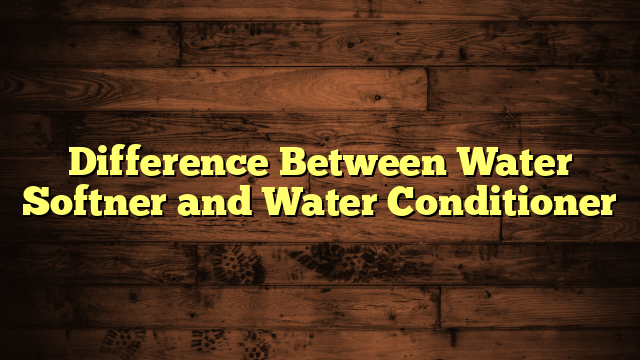Difference Between Water Softner and Water Conditioner
When you're considering how to improve your water quality, understanding the difference between a water softener and a water conditioner is essential. A water softener tackles hard minerals head-on, replacing them with sodium, while a water conditioner takes a different approach by altering mineral properties without removing them. So, which system is right for your needs? The answer might not be as straightforward as you think, and knowing the specific benefits and applications of each can make a significant difference in your decision-making process.
Key Takeaways
- Functionality: Water softeners remove hard minerals through ion exchange, while water conditioners alter mineral properties to prevent scale buildup without removing them.
- Maintenance: Water softeners require regular salt replenishment and maintenance, whereas water conditioners generally have lower maintenance needs.
- Health Impact: Softened water is higher in sodium, which may concern some health-conscious individuals, while conditioned water retains natural mineral content.
- Environmental Considerations: Water conditioners often employ eco-friendly methods without chemicals or salt, reducing environmental impact compared to traditional water softeners.
- Cost and Lifespan: Water softeners can save on appliance maintenance costs but may have higher initial costs, while conditioners offer a more budget-friendly option with fewer ongoing expenses.
Definition of Water Softeners
Water softeners are systems designed to tackle hard water by removing minerals like calcium and magnesium that can cause scale buildup and other issues. When you have hard water, you might notice that your appliances and plumbing suffer from calcium buildup, leading to inefficiency and costly repairs.
The process of softening water helps to mitigate these effects, ultimately extending the lifespan of your fixtures and appliances.
These systems work through a process called ion exchange, where hard water passes through a resin bed. The calcium and magnesium ions are exchanged for sodium ions, which don't cause scale buildup.
You'll appreciate the difference when you feel the softness of the water on your skin during showering or notice that your laundry comes out cleaner and brighter.
Additionally, you'll find that soap and detergents lather better in softened water, making cleaning tasks more efficient.
Investing in a water softener means taking a proactive approach to combatting water hardness and protecting your home from the adverse effects of mineral buildup.
Ultimately, a water softener can greatly enhance your quality of life by providing you with soft, clean water for everyday use.
Definition of Water Conditioners
Water conditioners serve a unique purpose in treating your water, primarily by improving its quality without removing minerals.
They come in various types, each designed to address specific water issues, and they offer several benefits that can enhance your home's water supply.
Understanding how these systems work will help you make informed choices about your water treatment options.
Purpose of Water Conditioners
If you've ever wondered how to improve your home's water quality without the full-scale approach of a water softener, a water conditioner might be just what you need. Water conditioners work by altering the properties of hard water, making it less likely to cause scale buildup and other issues. This can help extend the lifespan of your plumbing and appliances.
Here's a quick comparison of the benefits of water conditioners:
| Benefit | Description |
|---|---|
| Scale Reduction | Prevents mineral buildup in pipes and fixtures |
| Improved Taste | Enhances the flavor of drinking water |
| Lower Maintenance Needs | Reduces the frequency of cleaning and repairs |
Incorporating a water conditioner can lead to significant maintenance benefits. By addressing water quality concerns, you can enjoy cleaner appliances and a more enjoyable experience in your home. Water conditioners require less upkeep than water softeners, making them a great choice for many homeowners. Whether you're looking for straightforward maintenance tips or just want to enjoy better water, a water conditioner can be an excellent solution.
Types of Water Conditioners
When you're exploring options for improving your home's water quality, it's helpful to know that not all water conditioners are created equal.
There are several types of water conditioners designed to meet different needs and preferences. Understanding these types can empower you to make the right choice for your household.
- Mechanical Water Conditioners: These devices often use a physical process to condition water, like a water filtration system that removes impurities.
- Electronic Water Conditioners: By using electromagnetic waves, these conditioners can change the properties of hard minerals, reducing scale buildup.
- Chemical Treatment Systems: These systems involve adding specific chemicals to the water to counteract hardness and enhance its quality.
- Salt-Free Conditioners: These don't use traditional salt but instead rely on a different method, such as a template-assisted crystallization, to prevent scale buildup.
Each type has its own approach to water filtration and chemical treatments, catering to various needs.
Choosing the right water conditioner can greatly impact your water quality, making your home a more comfortable and healthier place to live.
Benefits of Water Conditioning
Conditioning your home's water can offer a range of benefits that greatly enhance your daily life. One of the most significant advantages is improved water quality. By conditioning your water, you reduce harsh minerals and contaminants, resulting in cleaner, safer water for drinking, cooking, and bathing.
This not only promotes better health but also improves the taste and smell of your water, making it more enjoyable for you and your family.
Another important benefit is the positive environmental impact. Unlike traditional water softeners that use salt, water conditioners often utilize eco-friendly methods to treat water.
This means you'll contribute less to water pollution and minimize the amount of salt that enters your local water supply. Furthermore, water conditioning can help extend the lifespan of your appliances and plumbing by reducing scale buildup, which often leads to costly repairs or replacements.
How Water Softeners Work
Water softeners operate by utilizing a process called ion exchange to remove hard minerals like calcium and magnesium from your water supply.
These minerals can affect your water quality and create issues with hard water, such as scale buildup in pipes and appliances. By reducing the hardness levels in your water, softeners help improve the overall efficiency of your home.
Here's how it works:
- Enhances the lifespan of appliances: Soft water prevents scale buildup, allowing your appliances to work efficiently longer.
- Improves skin and hair health: Soft water feels gentler, leaving your skin and hair softer and more hydrated.
- Boosts cleaning power: You'll notice that soap and detergents lather better with soft water, making cleaning easier and more effective.
- Saves money on energy bills: Less scale means appliances run more efficiently, lowering energy costs over time.
How Water Conditioners Work
Water conditioners use unique methods to improve your water quality without removing minerals like calcium and magnesium.
They often rely on an ion exchange process or magnetic technology to alter how minerals interact with your plumbing and appliances.
Ion Exchange Process
Utilizing a process known as ion exchange, water conditioners effectively reduce hard minerals like calcium and magnesium in your water supply. By swapping these unwanted ions with more benign ones, such as sodium or potassium, water conditioners substantially improve your water chemistry. This not only protects your plumbing but also enhances the overall quality of your water.
Here's how this process can impact your daily life:
- Softened water feels better on your skin during showers.
- Your appliances will last longer without mineral buildup.
- You'll notice brighter clothes after washing.
- Your dishes will sparkle without water spots!
Understanding the ion exchange process is essential for appreciating how a water conditioner works. It's a simple yet effective solution to combat hard water issues, thereby ensuring you enjoy a better quality of life.
With cleaner water, you're not just enhancing your home; you're also taking care of your health and environment. Embracing this technology means you can say goodbye to the negative effects of hard water and hello to a better living experience.
Magnetic Technology Benefits
Magnetic technology offers an innovative alternative for conditioning water, effectively altering the behavior of hard minerals. By utilizing magnetic fields, these devices influence the physical properties of minerals, preventing them from accumulating on surfaces.
Instead of removing minerals like a traditional water softener, water conditioners using magnetic technology modify how these minerals behave, which can help reduce scale buildup in pipes and appliances.
One of the significant advantages of magnetic technology is its energy efficiency. Since these devices don't require salt or chemicals, they save you from the ongoing costs associated with salt replenishment and maintenance of traditional softeners.
Furthermore, you'll find that water conditioned through magnetic technology often leads to less energy consumption. When your appliances operate more efficiently without scale buildup, they use less energy, which can lower your utility bills over time.
Benefits of Conditioning Water
Conditioning water can greatly enhance your home's plumbing and appliances by altering the way hard minerals behave.
Unlike traditional water softeners, water conditioners use various treatment methods to improve water quality without removing essential minerals. This process helps prevent scale buildup, which can lead to costly repairs and inefficient appliances.
Here are some benefits you can expect from conditioning your water:
- Longer appliance lifespan: Say goodbye to premature breakdowns and repairs!
- Softer skin and hair: Enjoy the luxuries of silky skin and smooth hair without the harsh effects of hard water.
- Improved taste and odor: Experience fresher, cleaner-tasting water straight from your tap.
- Eco-friendly: Reduce the need for harsh chemical cleaners, contributing to a cleaner environment.
Benefits of Water Softeners
Installing a water softener can considerably enhance your home's water quality and overall comfort. One of the most significant benefits is the reduction of hard minerals, like calcium and magnesium, which can lead to scale buildup in your plumbing.
With a water softener, you'll notice that your faucets, showerheads, and appliances function more efficiently due to fewer clogs and less wear and tear.
Moreover, soft water can improve the effectiveness of soaps and detergents, meaning you'll use less of them for laundry and dishwashing. This not only saves you money but also contributes to maintenance savings on appliances, as they won't have to work as hard to clean.
You might even find that your skin feels softer after showering, and your hair looks shinier, thanks to the absence of harsh minerals.
Another advantage is the extended lifespan of your water heater and other appliances. By minimizing scale buildup, you're likely to avoid costly repairs or replacements down the line.
Benefits of Water Conditioners
A water conditioner offers several benefits that can enhance your water quality without the need for salt or chemicals. By using a water conditioner, you can enjoy cleaner, healthier water for your home and family.
One of the primary advantages is its ability to reduce scale buildup in pipes and appliances, which can lead to costly repairs. Moreover, water conditioners are typically more environmentally friendly, minimizing your ecological footprint.
Here are some key benefits you'll experience:
- Improved taste and odor: Enjoy invigorating water that tastes great straight from the tap.
- Longer appliance lifespan: Protect your water heater and other appliances from mineral buildup.
- Reduced skin irritation: Experience softer skin and hair without the harsh effects of hard water.
- Lower energy bills: Save money as your appliances run more efficiently with conditioned water.
Common Applications and Usage
In households across the country, water conditioners find their place in various applications, enhancing water quality for everyday use. You might use a water conditioner in your home to improve the taste and odor of your drinking water, making it more enjoyable and healthier for your family.
These systems can help reduce scale buildup in pipes and appliances, prolonging their lifespan and ensuring they operate more efficiently.
In addition to common household uses, water conditioners also serve essential roles in industrial applications. Industries often rely on these systems to protect equipment from mineral buildup, which can lead to costly repairs and downtime.
For example, manufacturing facilities and food processing plants frequently utilize water conditioners to maintain clean water supplies critical for production processes.
Choosing the Right System
Selecting the right water treatment system can feel overwhelming with so many options available. You want to guarantee your system selection aligns with your specific needs and enhances your water quality. Here are a few key factors you should consider:
- Water hardness level: Understanding your water's hardness helps determine if you need a softener or conditioner.
- Budget constraints: Knowing your budget upfront can narrow down your options, making the decision easier.
- Maintenance requirements: Some systems require more upkeep than others, so assess your willingness to commit.
- Family health concerns: If anyone has allergies or sensitivities, this may influence your choice.
Take a moment to analyze your water quality and think about the specific challenges it presents.
Are you dealing with hard mineral buildup, or do you just want to enhance taste? Each system has its unique benefits, and finding the right match can greatly improve your daily life.
Frequently Asked Questions
Can Water Softeners and Conditioners Be Used Together?
Yes, you can use water softeners and conditioners together, but verify your system's compatibility first. Combining both can enhance your water treatment, providing better results for hard water problems and improving overall water quality in your home.
Do Water Conditioners Require Maintenance Like Softeners?
Did you know that regular maintenance can extend system longevity by up to 50%? While water conditioners don't need as much upkeep as softeners, routine checks still keep everything running smoothly and efficiently for you.
How Do I Know Which System I Need?
To determine which system you need, assess your water quality and system requirements. Test for hardness and contaminants, then choose a solution that addresses your specific concerns, ensuring ideal performance for your household needs.
Are Water Softeners Safe for Plants and Gardens?
Imagine nurturing a garden; just as you wouldn't use harsh chemicals, water softeners can affect water quality. They're generally safe for plants, but too much sodium might harm plant health if overused.
What Is the Cost Difference Between Softeners and Conditioners?
When considering cost comparison, you'll find that price factors for water softeners typically range higher than conditioners. Installation, maintenance, and system type all influence the overall expense, so it's wise to evaluate your specific needs.
Conclusion
In conclusion, choosing between a water softener and a water conditioner depends on your specific needs. Did you know that about 85% of U.S. households have hard water? This makes understanding these two systems essential for improving your water quality. Water softeners effectively eliminate hard minerals, while water conditioners modify their behavior to prevent scale. By evaluating your household's water issues, you can select the right system and enjoy cleaner, better-tasting water.







